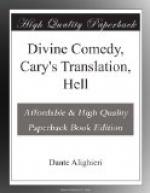“To know of some is well;” thus he replied,
“But of the rest silence may best beseem.
Time would not serve us for report so long.
In brief I tell thee, that all these were clerks,
Men of great learning and no less renown,
By one same sin polluted in the world.
With them is Priscian, and Accorso’s son
Francesco herds among that wretched throng:
And, if the wish of so impure a blotch
Possess’d thee, him thou also might’st
have seen,
Who by the servants’ servant was transferr’d
From Arno’s seat to Bacchiglione, where
His ill-strain’d nerves he left. I more
would add,
But must from farther speech and onward way
Alike desist, for yonder I behold
A mist new-risen on the sandy plain.
A company, with whom I may not sort,
Approaches. I commend my Treasure to thee,
Wherein I yet survive; my sole request.”
This said he turn’d, and seem’d as one
of those,
Who o’er Verona’s champain try their speed
For the green mantle, and of them he seem’d,
Not he who loses but who gains the prize.
CANTO XVI
Now came I where the water’s din was heard,
As down it fell into the other round,
Resounding like the hum of swarming bees:
When forth together issu’d from a troop,
That pass’d beneath the fierce tormenting storm,
Three spirits, running swift. They towards us
came,
And each one cried aloud, “Oh do thou stay!
Whom by the fashion of thy garb we deem
To be some inmate of our evil land.”
Ah me! what wounds I mark’d upon their limbs,
Recent and old, inflicted by the flames!
E’en the remembrance of them grieves me yet.
Attentive to their cry my teacher paus’d,
And turn’d to me his visage, and then spake;
“Wait now! our courtesy these merit well:
And were ’t not for the nature of the place,
Whence glide the fiery darts, I should have said,
That haste had better suited thee than them.”
They, when we stopp’d, resum’d their ancient
wail,
And soon as they had reach’d us, all the three
Whirl’d round together in one restless wheel.
As naked champions, smear’d with slippery oil,
Are wont intent to watch their place of hold
And vantage, ere in closer strife they meet;
Thus each one, as he wheel’d, his countenance
At me directed, so that opposite
The neck mov’d ever to the twinkling feet.
“If misery of this drear wilderness,”
Thus one began, “added to our sad cheer
And destitute, do call forth scorn on us
And our entreaties, let our great renown
Incline thee to inform us who thou art,
That dost imprint with living feet unharm’d
The soil of Hell. He, in whose track thou see’st
My steps pursuing, naked though he be
And reft of all, was of more high estate
Than thou believest; grandchild of the chaste
Gualdrada, him they Guidoguerra call’d,




